






By clicking login button, you are agreeing to our Privacy terms and User Policy
Understand the Illness Related to our Emotions
We are currently amidst the transition of seasons, the humidity varies a lot, and this may affect our emotions.
Aside from taking care of your own emotions, be sure to pay attention to those around you, and to lend a helping hand when they’re in need. The earlier these illnesses are detected the better.
Alzheimer’s
- Unable to recall what happened in the past
- Cannot remember the objects in the memory test
- Changes in temper
- Declining oral and general comprehension ability
- Declining ability to understand physical spaces
- Cognitive impairment that affects daily life
Bipolar Disorder
Patients will become extremely hyperactive and energetic during a manic episode, but will become sad and irritable during a period of depression.
- Talkative
- Arrogant and haughty
- Needing less sleep
- Generating various ideas
- Finding it difficult to concentrate
- Overly energetic and unable to calm down
- Doing things that often have disastrous consequences – such as spending large sums of money on expensive and sometimes unaffordable items, or making investments without contemplation.
Depression
- Continued feelings of depression and sadness
- Feelings of hopelessness and helplessness
- Feelings of guilt or worthlessness
- Feeling agitated towards others
- Loss of interest in daily activities
- Feelings of anxiety
- Considering suicide or self-mutilation
- Avoiding social activities
- Loss of interest in hobbies once loved
Panic Disorder
- Shortness of breath, and feelings of being choked
- Rapid, pounding heart rate
- Dizziness, lightheadedness or faintness
- Tightness in throat
- Sweating’
- Nausea or abdominal cramping
- Feelings of unreality or detachment – as if you don’t really exist, and is detached from your surroundings
What can we do...
1. Accompany, listen to and encourage the patient. Avoid strong or negative language.
2. Observe the patient’s behavior, mind flow, and changes of mood by listening to him or her.
3. Constantly check in on him or her. Accompany them with patience.
4. Help the patient feel confident and useful.
5. Interact with the patient in a natural manner.
6. Accompany them to seek medical attention or provide relevant resources.
You can be a little different after 50. Be young at heart and you can live an elegant and fulfilling life.
By now, you should have a better understanding of time and money management. Let us enjoy life, fulfill our dreams and live for ourselves!
Gan Dan Academy is an online learning site with “elegant life” and “friendly care” being the two main themes. Using videos, you can browse topics such as health, food, home care, assistive tools and other topics you’re interested in for free.
Let us live an elegant life after 50!
“Elegant life” – stay healthy, do exercise, keep a healthy diet, never give up on learning, have fun.
You may be “old” but you can still live a free and fulfilling life. In Gan Dan Academy, you can access different resources every day, enriching your life.
“Friendly care” – home care, life care, assistive tools, moving safely, environment inspection.
When “caring” for others, you are not alone. Learn all the essential tips and knowledge from Gan Dan Academy to relieve stress.
Ø Feel free to follow Gan Dan Academy’s Facebook page:
https://www.facebook.com/GanDan2018/
Ø Feel free to add Gan Dan Academy on Line
Search for ID: @gandan
LINE@:http://line.me/ti/p/%40nvb3485w
Ø Stella Matutina provides long-term care education, long-term care, women care, devotion service. For more information, please check out -> Stella Matutina Social Welfare Foundation.
Recommend
-

低衝擊心肺有氧
Course summary
4864 view(s) -

優雅甘丹。5/5 Never too late 打造更美好的自己
Course summary
4129 view(s) -
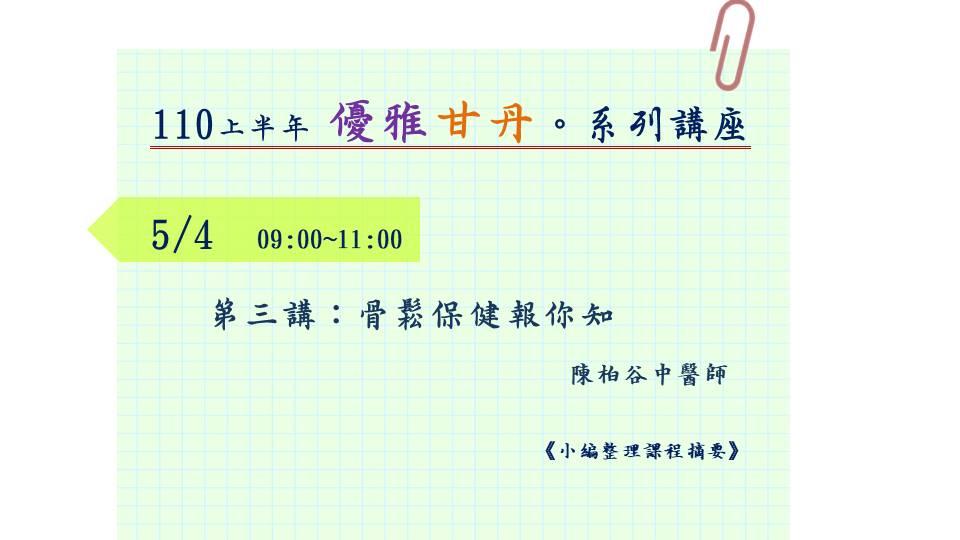
優雅甘丹。5/4 骨鬆保健報你知
Course summary
4214 view(s) -

優雅甘丹。5/3 銀髮鬥志-老年靈修生活
Course summary
4332 view(s) -
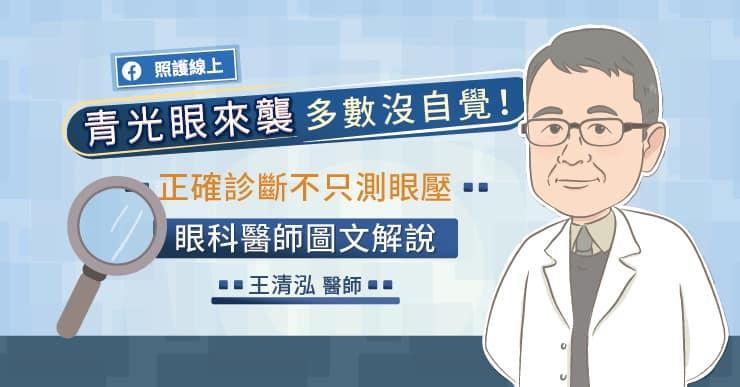
青光眼來襲,多數沒自覺!正確診斷不只測眼壓,眼科醫師圖文解說
Course summary
5429 view(s) -
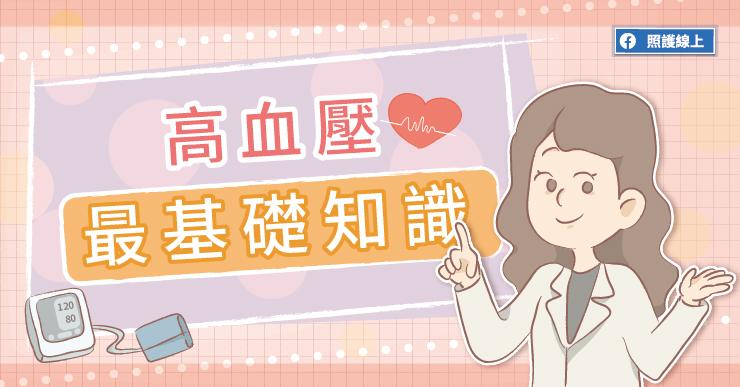
血壓多少才OK?有什麼症狀?高血壓最基礎知識(圖解懶人包)
Course summary
5310 view(s) -
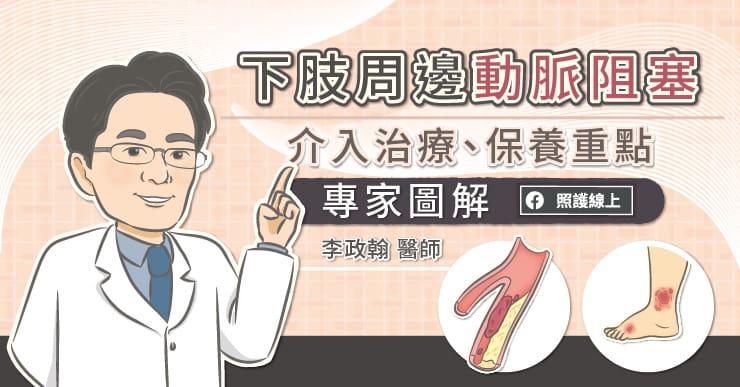
下肢周邊動脈阻塞,介入治療、保養重點,專家圖解
Course summary
4801 view(s) -

癌友自療-與癌共處
Course summary
4404 view(s) -

自癒力教室-你夠水嗎?別讓缺水成為健康潰堤的關鍵!
Course summary
4372 view(s) -

自癒力教室-找回食物好滋味
Course summary
4376 view(s) -

護膝運動
Course summary
4746 view(s) -

自癒力教室-人際四妙招
Course summary
4660 view(s) -
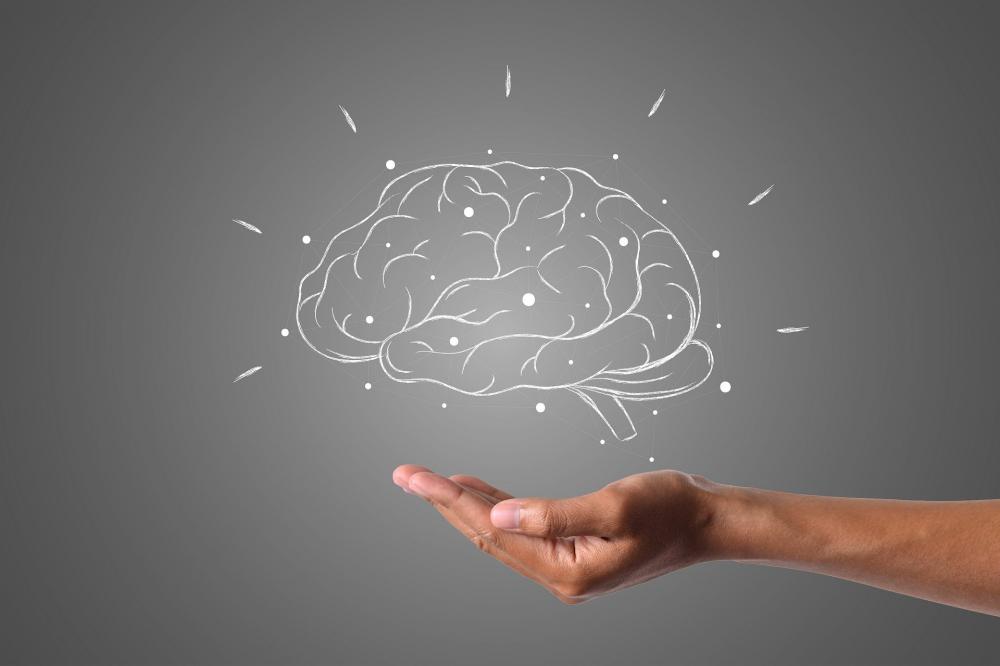
自癒力教室-輕鬆動腦不失智
Course summary
5090 view(s) -

甘丹來運動:舒緩科技文明病的運動
Course summary
5224 view(s) -

甘丹來運動:居家用具運動
Course summary
5369 view(s) -

我是失智症的高危險族群嗎?
Course summary
5019 view(s) -

淺談安心減壓
Course summary
5360 view(s) -

高齡長者預防跌倒須知
Course summary
4667 view(s) -

Self-Healing Classroom – Diversified Exercise
Course summary
5453 view(s) -

Understanding Degenerative Joint Disease
Course summary
4660 view(s) -
Is Constipation troubling you? Five minutes of Abdominal Exercise Promotes Smooth Bowel Movements
Course summary
4819 view(s) -

Traditional Chinese Exercise – Baduajin Quigong Part2
Course summary
5372 view(s) -
自癒力教室-吃出生活中的自癒力
Course summary
4706 view(s) -

What Should We Do When Confronting Cancer
Course summary
4585 view(s) -

Traditional Chinese Exercise – Baduajin Quigong Part1
Course summary
5700 view(s) -

Self-healing – The Dangers of Sitting Long
Course summary
4965 view(s) -

Osteoporosis is not just for old people – 30 year-olds may get it too!
Course summary
4857 view(s) -

Gan Dan Exercise: Spinal Exercise
Course summary
5121 view(s) -
Self-healing – Mouth Exercises
Course summary
4600 view(s) -

5類「好」脂食物,降膽固醇還能控血糖
Course summary
5707 view(s) -
Self-Healing – The Doctors inside of You
Course summary
5010 view(s) -

Protect your heart with 3 Yoga Styles to Make Your Body and Blood Vessels Flexible!
Course summary
5342 view(s) -

不想中秋烤肉暴肥?營養師:避開4大熱量地雷食材
Course summary
4783 view(s) -
一日三餐軟食料理-晚餐
Course summary
5205 view(s) -
一日三餐軟食料理-午餐
Course summary
5118 view(s) -
一日三餐軟食料理-早餐
Course summary
4964 view(s) -

Strokes – How to Recognize It
Course summary
4940 view(s) -

Notes on Strokes - Reminders
Course summary
4956 view(s) -

中醫講堂:提升免疫力 中藥茶飲篇
Course summary
6030 view(s) -

Traditional Chinese Medicine Lecture: Strengthen the Immune System - Diet
Course summary
4771 view(s) -

Traditional Chinese Medicine Talk: Strengthening Your Immune System – Acupuncture Points
Course summary
5111 view(s) -
Dairy Products in Light Meal – Salad with Fruit, Shrimp and Yogurt Dip
Course summary
4946 view(s) -

Breathe and Relax Muscles is Easy! Tips from a Psychiatrist
Course summary
5885 view(s) -
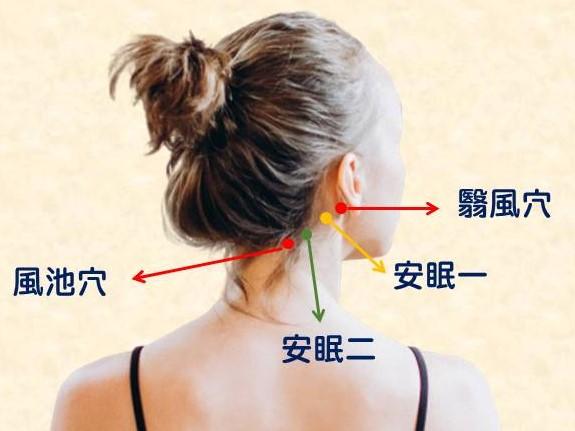
Traditional Chinese Medicine Talk: Sleeplessness – Acupuncture Points
Course summary
5155 view(s) -

Traditional Chinese Medicine Lecture: Sleeping Disorder (Insomnia) - Diet
Course summary
5178 view(s) -

Day Care Centre is Your Best Support
Course summary
5713 view(s) -
【Stew Meatball】 The Best Way to Consume Protein!
Course summary
5210 view(s) -
6 Warning Signs from Headaches
Course summary
5205 view(s) -

Stella Matutina Sid Club – Happy Exercises for Seniors
Course summary
7099 view(s) -
Gan Dan Exercise: Upper-body Rehabilitation
Course summary
5244 view(s) -
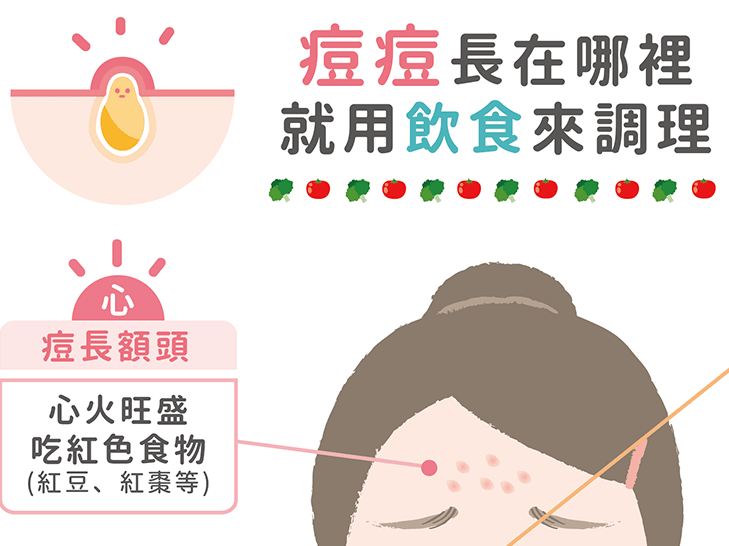
Eat The Right Food To Fight Acnes
Course summary
7455 view(s) -

The 6 benefits of Eating Watermelon – Keep Hydrated and Relieve Muscle Soreness!
Course summary
6358 view(s) -

Gan Dan Exercises: Rehabilitating Lower Limbs
Course summary
5479 view(s) -
Traditional Chinese Medicine: Modern Illnesses – Acupuncture Points
Course summary
5379 view(s) -

A Dry Throat is Not COVID, 5 Warning Signs from a Runny Nose
Course summary
6389 view(s) -

Move Around to Alleviate Anemic Symptoms
Course summary
5840 view(s) -

Eating Out Healthily
Course summary
5384 view(s) -
Wash Your Hands With the Nun!
Course summary
7351 view(s) -
How PM2.5 Affects our Lungs and Heart
Course summary
4984 view(s) -

Drinking Excessive Coffee will Expose you to Risk
Course summary
5458 view(s) -
Washing your Hands is the Key to Fighting the Virus
Course summary
6017 view(s) -
Mycoplasma hyopneumoniae
Course summary
4944 view(s) -

The Walking Pneumonia-Mycoplasma Pneumonia (For dummies)
Course summary
6280 view(s) -
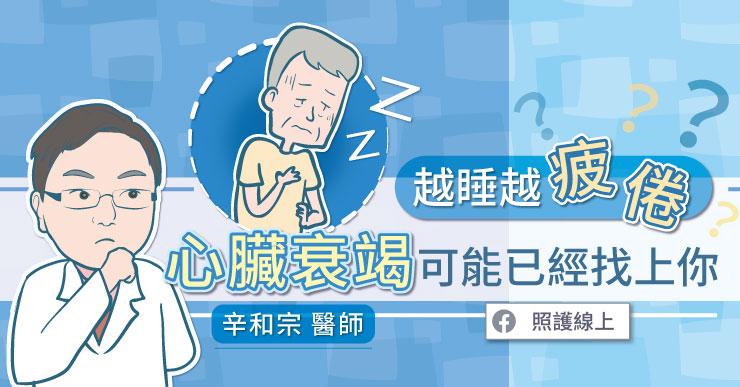
Feeling Even More Tired After Waking up? Watch Out for Heart Failure
Course summary
BEST5657 view(s) -

4 Exercises to Prevent Epidemics! Strengthen your Immune System to Fight Viruses!
Course summary
5221 view(s) -

5 Important Concepts – What to do after Throwing away Face Masks
Course summary
5378 view(s) -

Here comes the Virus! Are we Washing our Hands Correctly? Let the Doctor Show you the Right Way!
Course summary
5586 view(s) -

Face mask Shortage! Let the Doctor Teach you how to Use and Preserve It Correctly!
Course summary
5328 view(s) -

How to Yield Results from Exercising? Aerobic Exercise Treats High Blood Pressure!
Course summary
5922 view(s) -

Want to Strengthen your Immune System? Change these Bad Habits First!
Course summary
5551 view(s) -

Test your Attention and Responsiveness
Course summary
5768 view(s) -

Cataract is linked to Macular Degeneration
Course summary
5495 view(s) -

Eat These to Fight Inflammation! (For Dummies)
Course summary
6189 view(s) -

Preventing Urinary Incontinence Amongst Women through Exercising
Course summary
5747 view(s) -

Coldness Causes Illness. Six Body Parts that Fear Coldness the Most!
Course summary
6427 view(s) -
Eat Cabbage -> Fight Air Pollution
Course summary
5632 view(s) -
Beware of Feet Stroke! The 5 Symptoms of Limb Stroke
Course summary
5701 view(s) -

How Old is Your Body? Let These 5 Circulatory Tests Tell You
Course summary
5742 view(s) -

Praying-style Qigong
Course summary
6714 view(s) -

Dry Mouth, Dry Skin? 13 Food you Must Eat in Autumn
Course summary
HOT9092 view(s) -
Am I Just Forgetful?
Course summary
BEST6329 view(s) -

Easy Workout Lessons for the Elderlies-Lesson 10【Lower limb stretching】
Course summary
6227 view(s) -

Easy Workout Lessons for the Elderlies-Lesson 9【Core stretching】
Course summary
5973 view(s) -

Easy Workout Lessons for the Elderlies-Lesson 8【Shoulder stretching】
Course summary
6097 view(s) -

Easy Workout Lessons for the Elderlies -Lesson 7【Lower limb exercise】
Course summary
6365 view(s) -

Easy Workout Lessons for the Elderlies - Lesson 6【Core exercise】
Course summary
6491 view(s) -

Easy Workout Lessons for the Elderlies - Lesson 5【Shoulder exercise】
Course summary
6493 view(s) -
Easy Workout Lessons for the Elderlies - Lesson 4【Cardio Tai Chi】
Course summary
6570 view(s) -

Easy Workout Lessons for the Elderlies - Lesson 3【Cardio karate】
Course summary
6408 view(s) -

Easy Workout Lessons for the Elderlies - Lesson 2【Cardio swimming】
Course summary
6350 view(s) -

Easy Workout Lessons for the Elderlies- Lesson 1【Cardio running】
Course summary
6798 view(s) -

Sarcopenia
Course summary
HOT8869 view(s) -

8 Ways to Choose “Vinegar” by Color and Smell
Course summary
6227 view(s) -

Colorectal cancer screening
Course summary
6438 view(s) -

Your Healthiest Decision! Eating these 5 Fruits can Lower Cholesterol
Course summary
6571 view(s) -

Bad Habits that Harm the Brain
Course summary
5848 view(s) -

Prevent Osteoporosis with Healthy Eating Habits and Exercise!
Course summary
5617 view(s) -
6 Types of Nutrients to Prevent Cataract and Macular Degeneration
Course summary
6510 view(s) -

Feeling Heated in the Summer? Press these 4 Acupuncture Points to Clear Dampness and Heat.
Course summary
6956 view(s) -

Are Your Eyes Feeling Sore?
Course summary
6455 view(s) -

Make Good Use of the Wall and Do Exercise Anywhere, Anytime!
Course summary
6424 view(s) -
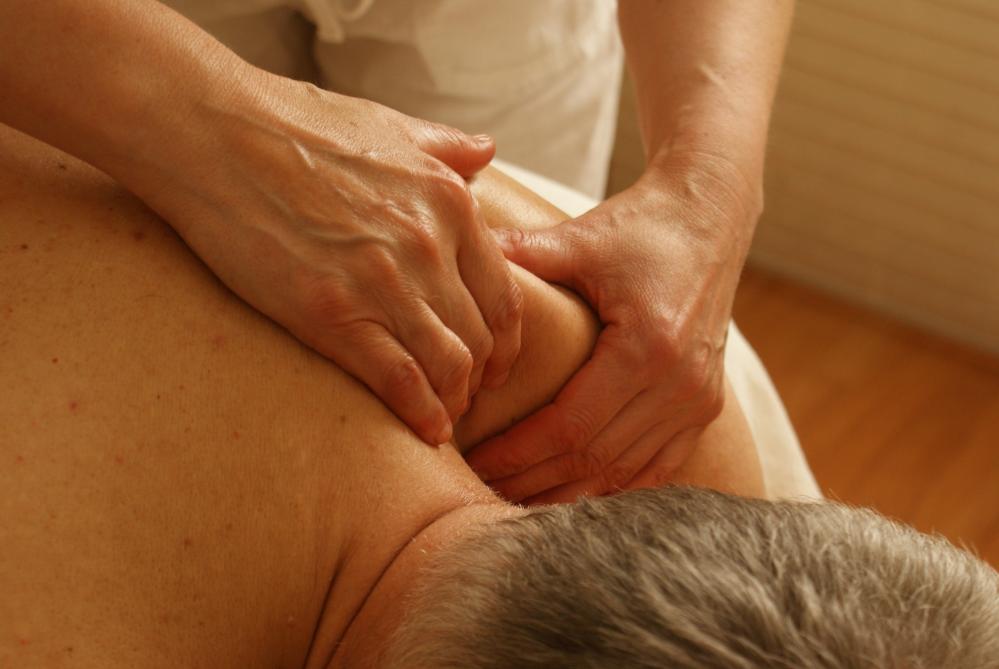
Relief Pain with Yuan Shi Dian
Course summary
HOT13323 view(s) -

7 “Natural” Ingredients that can Lower Blood Pressure!
Course summary
6121 view(s) -

Six Ways to Prevent Knee Pain
Course summary
6193 view(s) -
“Gan Dan” Culinary School – Layer Cake
Course summary
6770 view(s) -
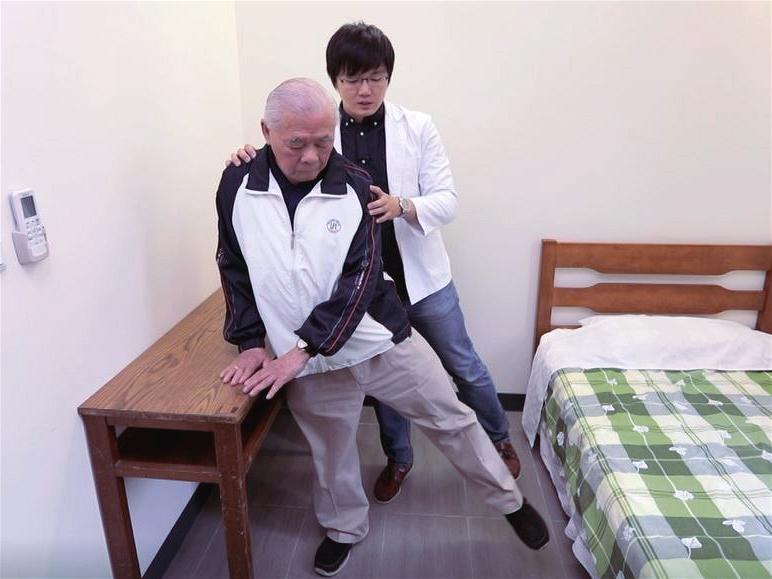
Home Rehab Exercises
Course summary
7309 view(s) -

Festive Dance Workout
Course summary
6010 view(s) -

Light Exercise After 40, Keeps Your Body 12 Years Younger
Course summary
6296 view(s) -

Fashionable Old Age!
Course summary
6718 view(s) -

The 5 Common Winter Illnesses
Course summary
6356 view(s) -

新冠肺炎後疫情時代的骨鬆治療
Course summary
4013 view(s) -
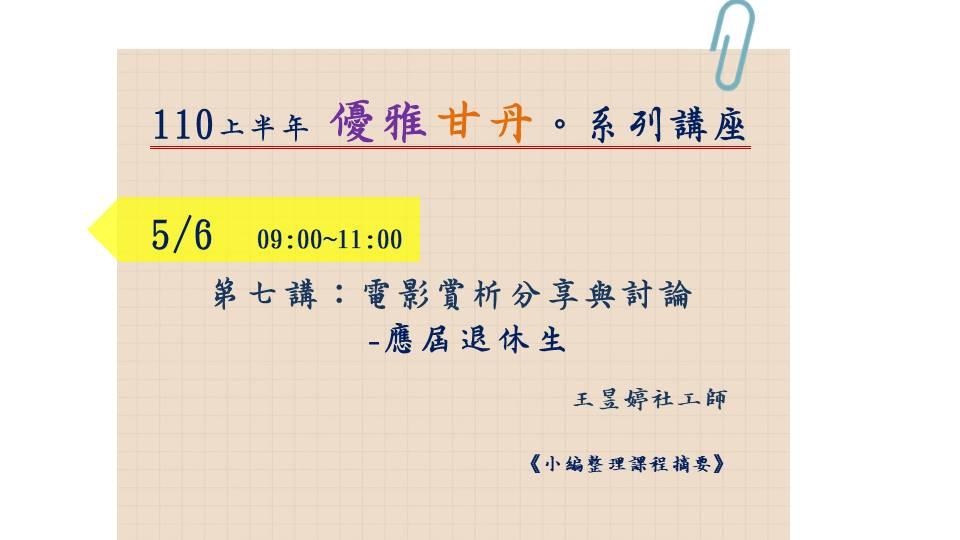
優雅甘丹。5/6 電影賞析分享與討論-應屆退休生
Course summary
4337 view(s) -

省水小妙招
Course summary
4584 view(s) -
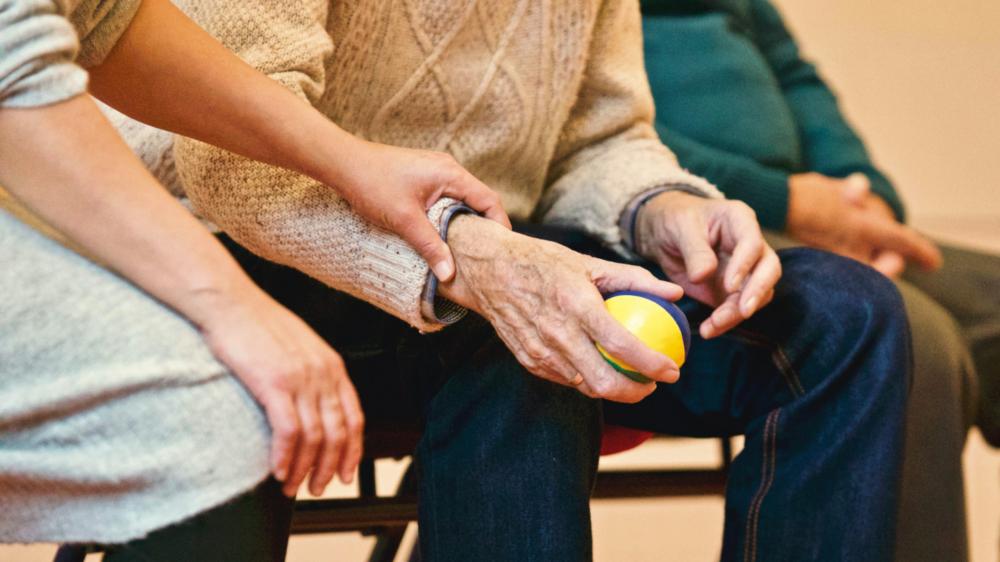
長照2.0復能照護服務-ADLs(日常生活活動)復能照護
Course summary
6054 view(s) -

憶起找回笑容:失智共同照護中心
Course summary
4822 view(s) -

終活代辦事項
Course summary
4828 view(s) -

翻轉你的照顧觀念
Course summary
4569 view(s) -
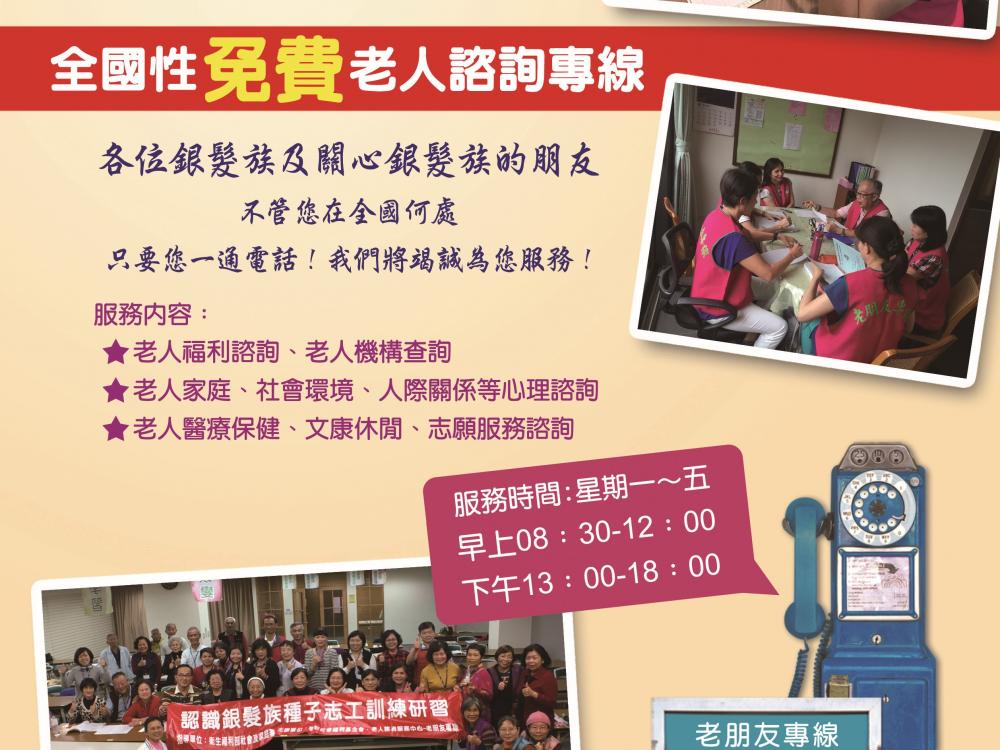
What is the National Advisory Line for the Elderly?
Course summary
5077 view(s) -
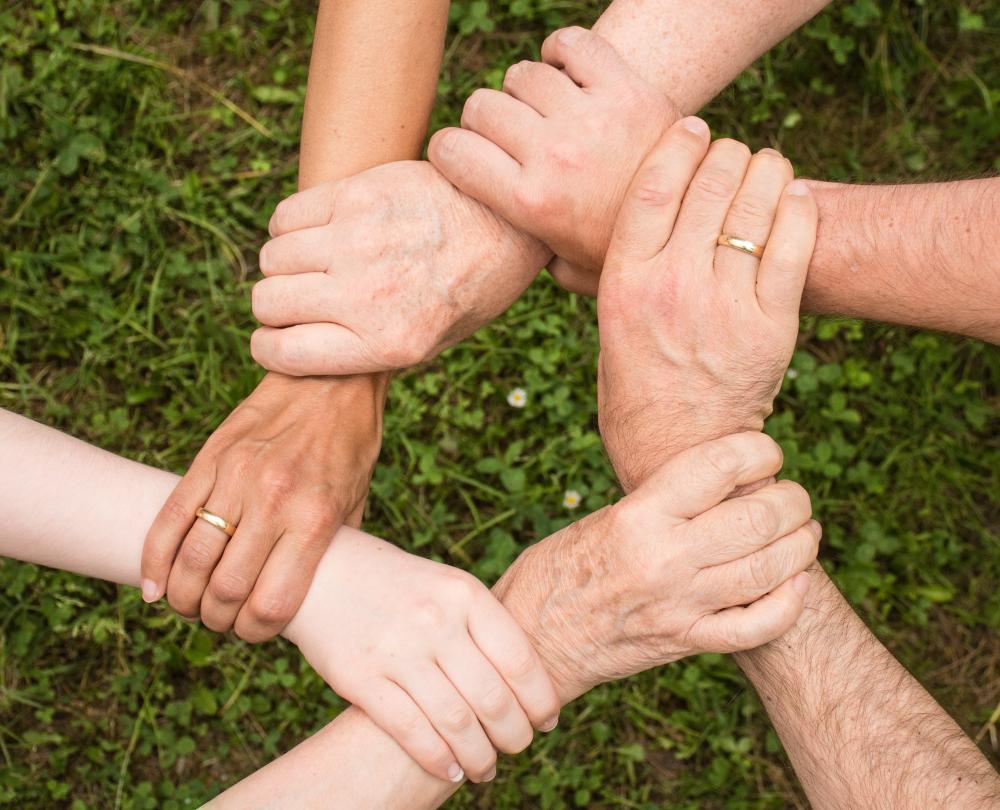
Elder Happy Land: A Geriatric Daycare Center
Course summary
5199 view(s) -

Service for All Ages
Course summary
5055 view(s) -

My Fake Family: Becoming Part of My Life
Course summary
4939 view(s) -
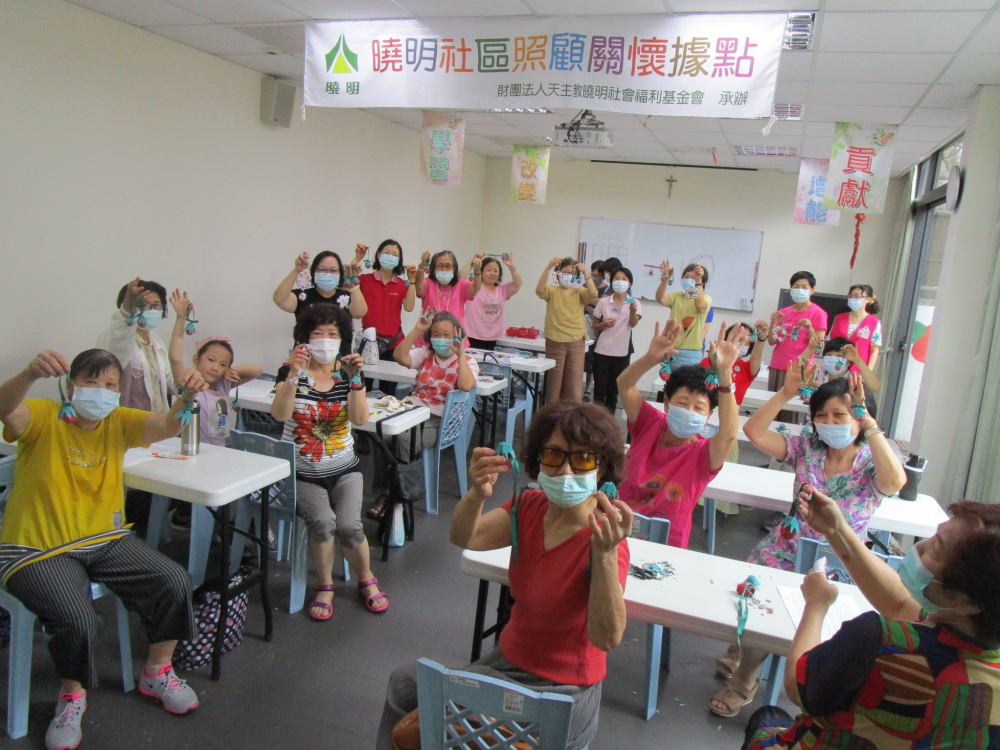
Visitations from Volunteers
Course summary
BEST5319 view(s) -

The Difficulties and Hardship Family Faces When Caretaking
Course summary
5679 view(s) -
Shu-Fen Chang Discusses Philosophies in the Face of COVID-19
Course summary
5322 view(s) -

Exhausted From Taking Care of Others: Resources For Caretakers
Course summary
5287 view(s) -
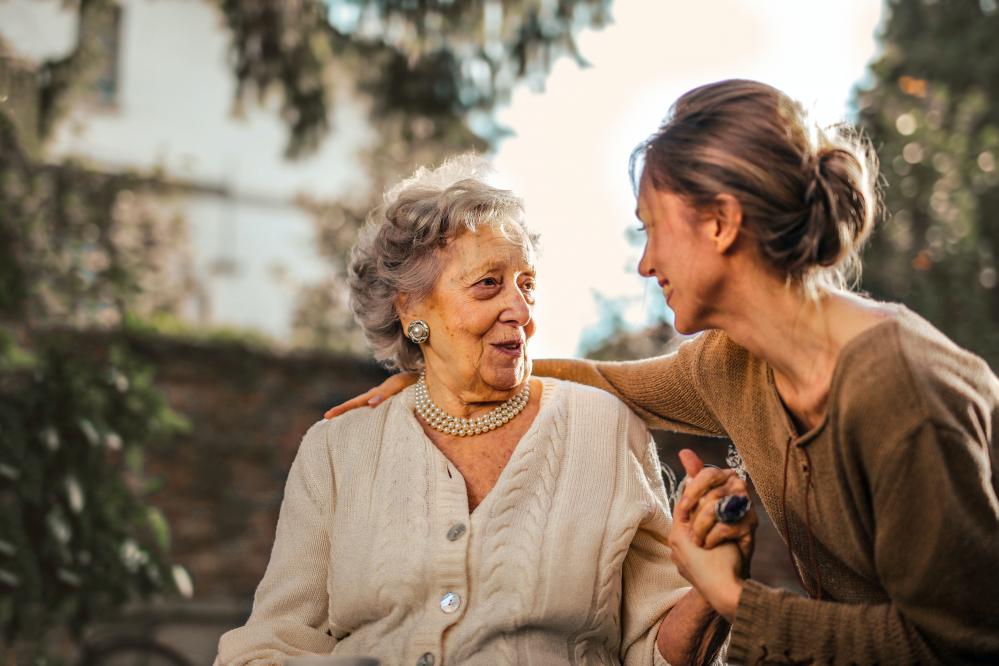
Service with Care: Resources and Introduction to Long-term Care
Course summary
6066 view(s) -
How do we Face the Last Stages of Life? “Don’t become a burden to our children.” says Nien-Jen, Wu.
Course summary
5539 view(s) -

Long-term care-care managers
Course summary
5637 view(s) -
Plan a Perfect Retirement Plan with Three Buckets of Gold
Course summary
5612 view(s) -
Two Life Stages that you Must Face When Planning your Retirement
Course summary
5524 view(s) -
The Importance of a Retirement Plan
Course summary
5592 view(s) -
Happy Retirement(III)
Course summary
5265 view(s) -
Happy Retirement(II)
Course summary
5410 view(s) -
What to Prepare for Retirement?
Course summary
5679 view(s) -

You can live your life at 85 like this!
Course summary
5598 view(s) -

25th Anniversary Senior Trend Special Report: (Special Thanks to our Senior Caretakers)
Course summary
6254 view(s) -
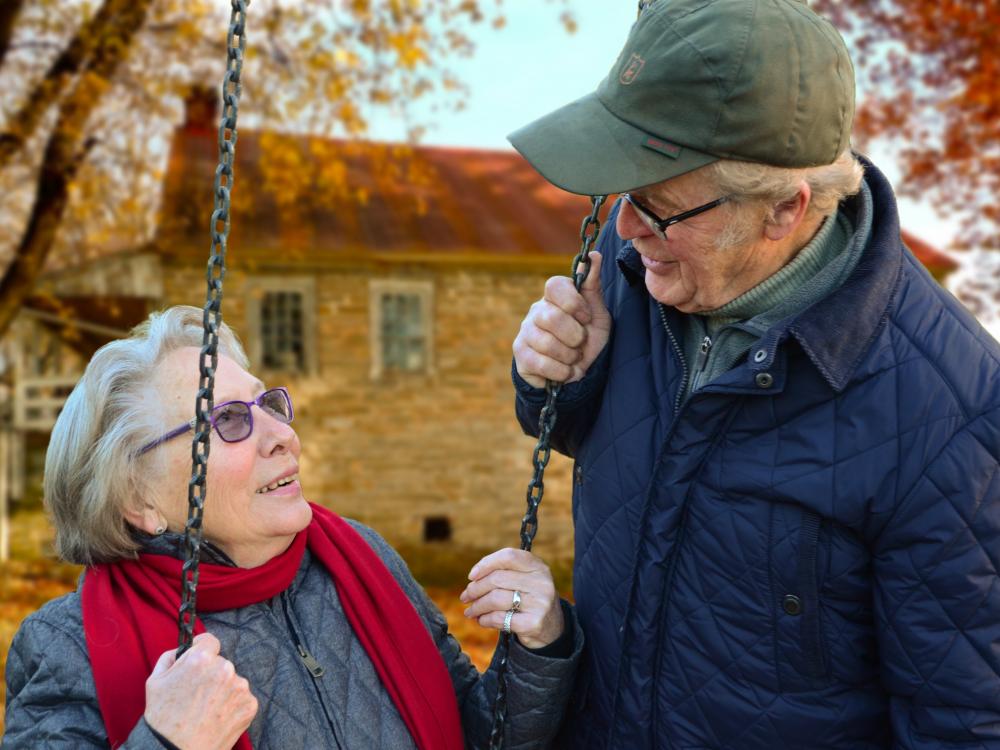
Long-term care - caretaker
Course summary
BEST5723 view(s) -
The Lucky Trilogy of Man Chuan Chang
Course summary
6220 view(s) -
How to Prevent Falling?
Course summary
5710 view(s) -
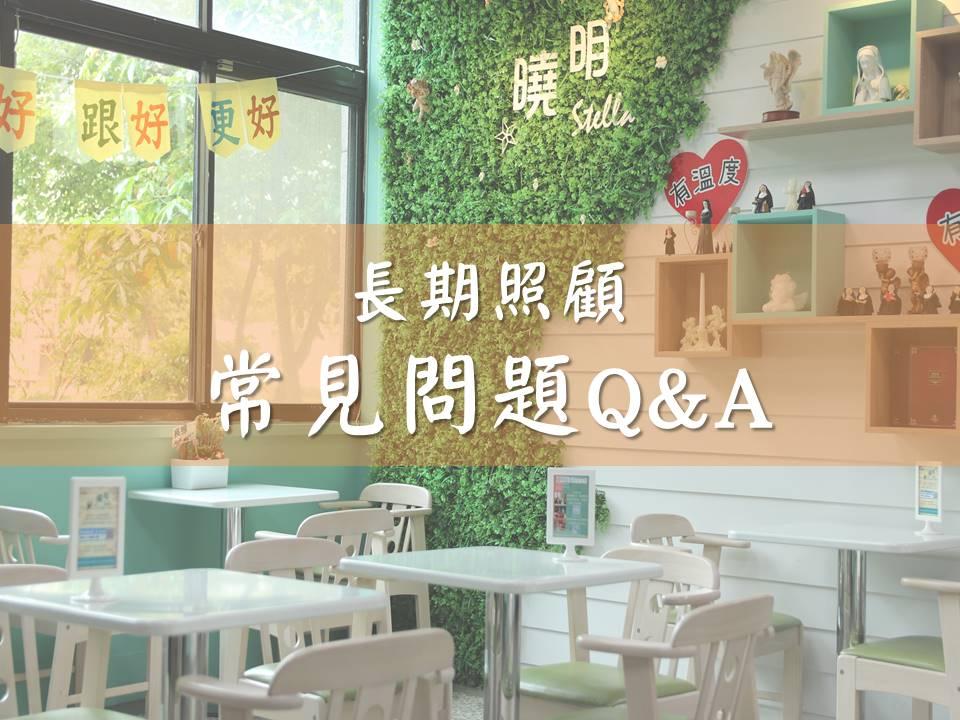
Long-term care-FAQ
Course summary
6467 view(s) -

What’s Included in the Long-Term Care Service?
Course summary
5933 view(s) -
Do Not Run from Negativity, “Embrace It”—Kevin Tsai
Course summary
HOT8168 view(s) -

Practicing goodbyes: The café that made death warmer
Course summary
6395 view(s) -
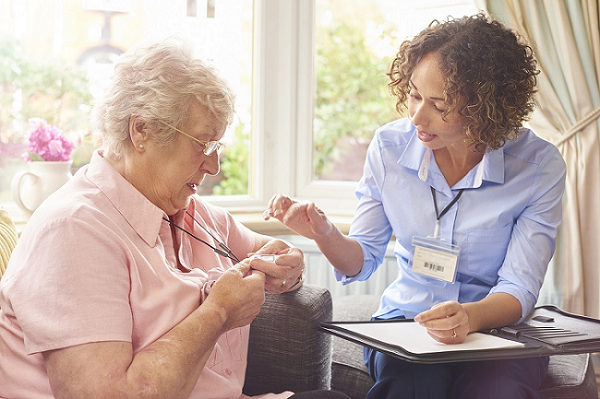
Homecare Assistive Device – Fall and regret for the rest of your life! The safety of solitary elderlies relies on these
Course summary
6167 view(s) -

【Home Safety】Living Room
Course summary
6375 view(s) -
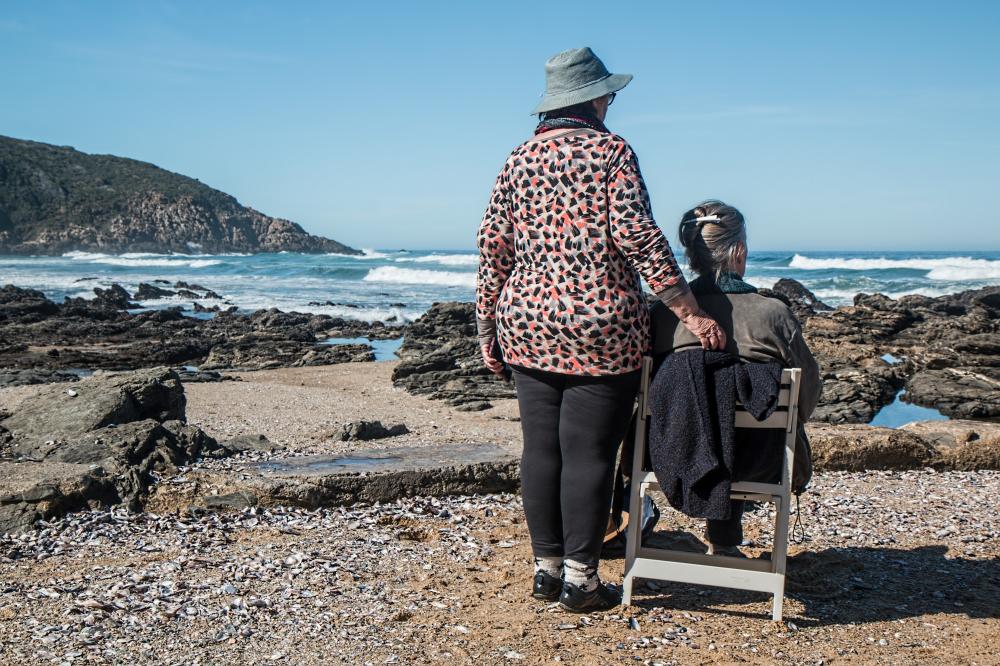
Six Misconceptions of a Home Service Provider
Course summary
6013 view(s) -
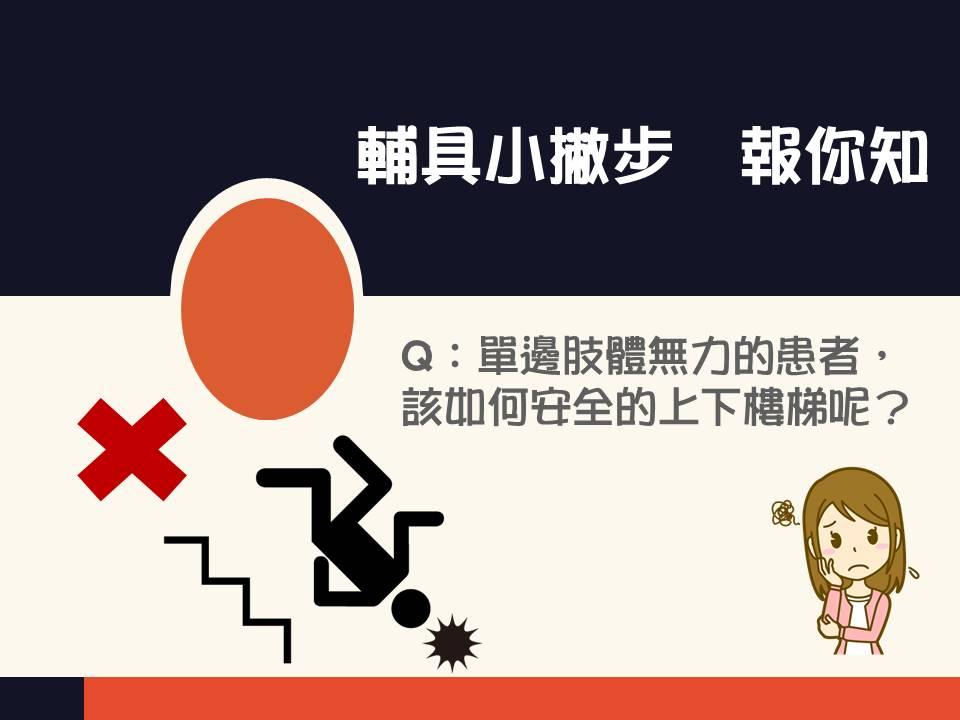
【Tips on Assistive Device】Stairs
Course summary
6194 view(s) -
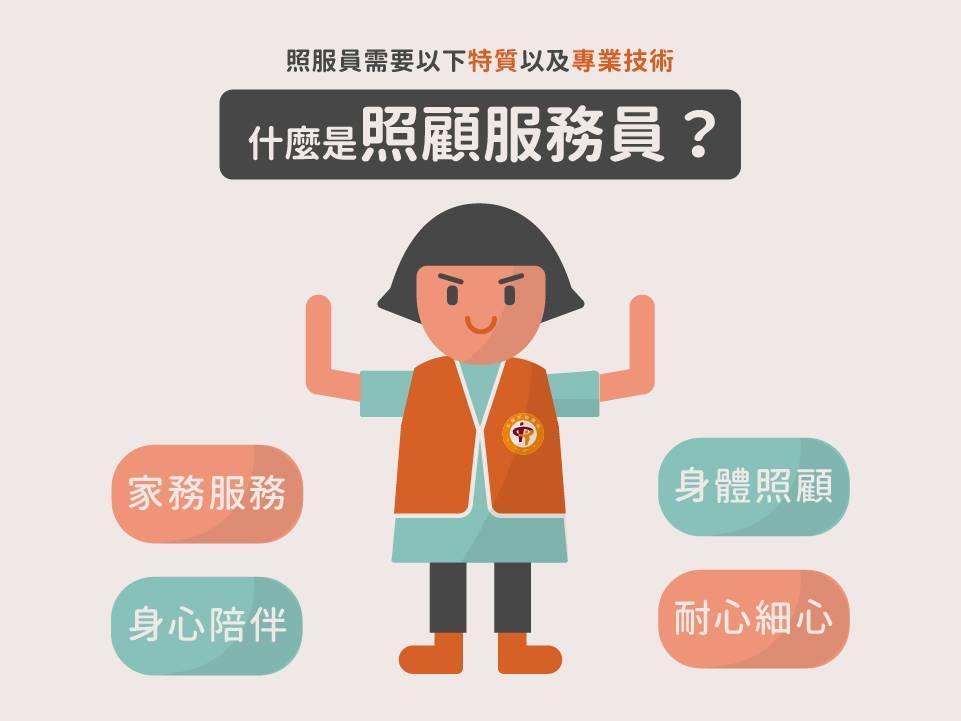
Home Service Key: Nursing Aide
Course summary
7765 view(s) -
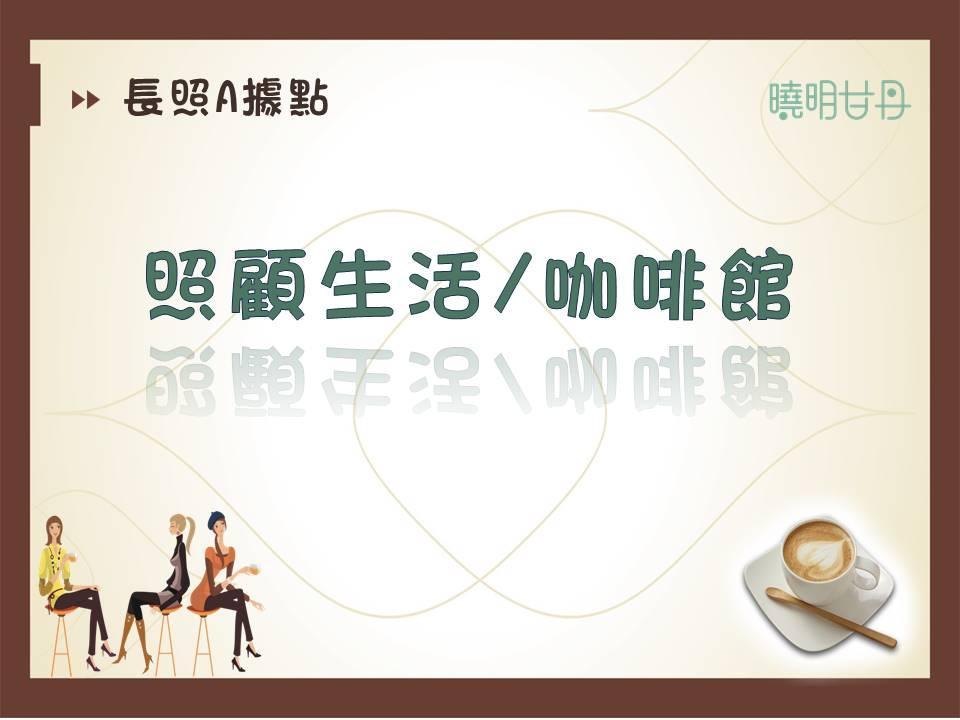
Long Term Care A – Caretaking Centre
Course summary
6427 view(s) -

【Home Safety】Bathroom
Course summary
6443 view(s)
Related Courses
-
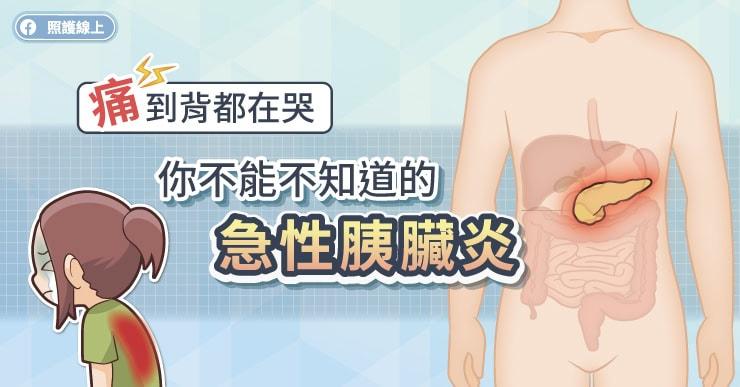
痛到背都在哭:你不能不知道的急性胰臟炎
NEW -
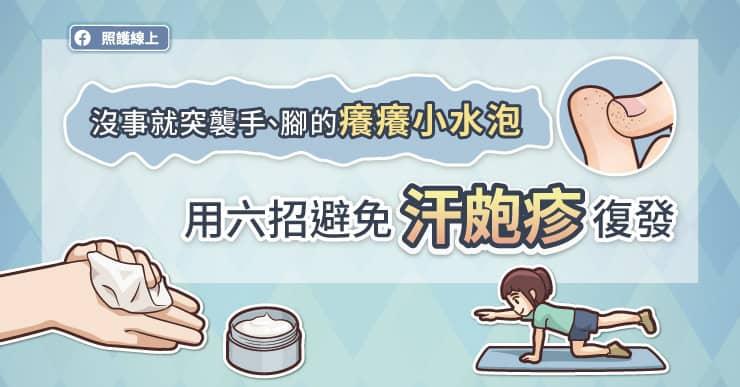
沒事就突襲手、腳的癢癢小水泡,用六招避免汗皰疹復發
NEW -
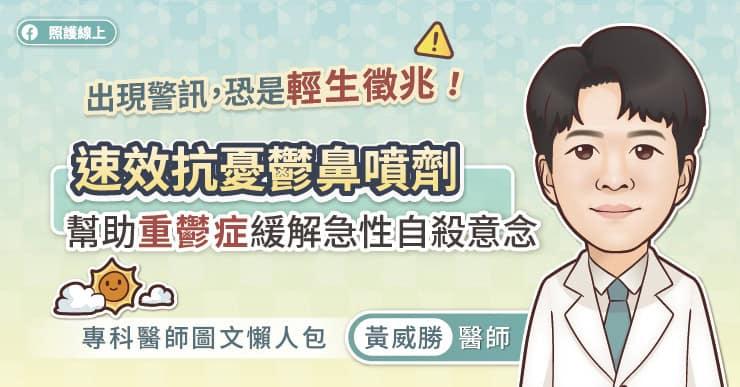
出現警訊,恐是輕生徵兆!
NEW -
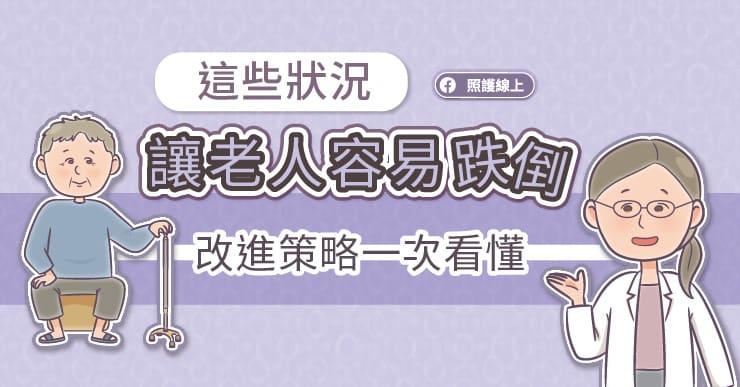
這些狀況讓老人容易跌倒,改進策略一次看懂
NEW -
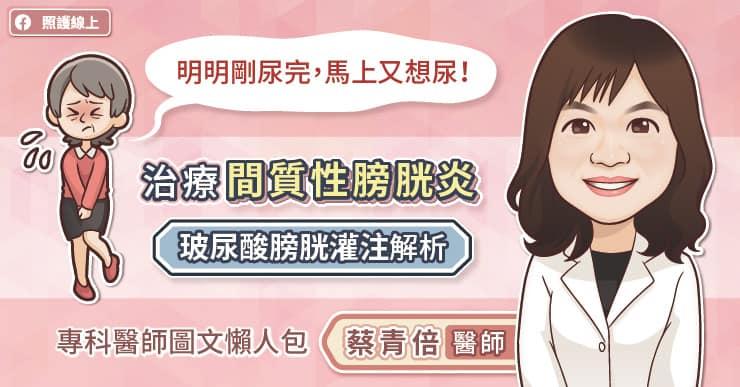
明明剛尿完,馬上又想尿!治療間質性膀胱炎,玻尿酸膀胱灌注解析,專科醫師圖文懶人包
-

電視變暗、變模糊,原來是白內障惹禍!
-
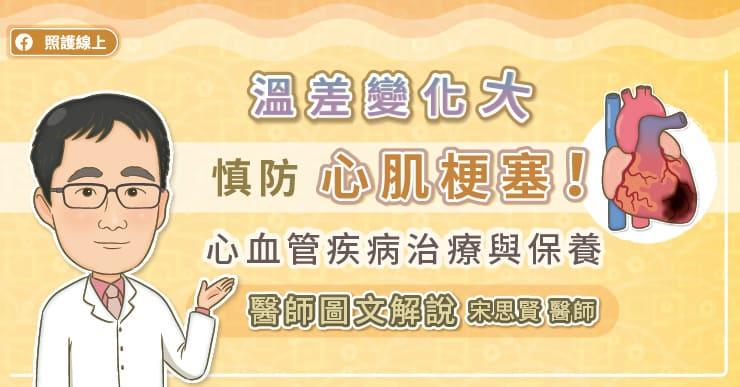
溫差變化大,慎防心肌梗塞,心血管疾病治療與保養
-
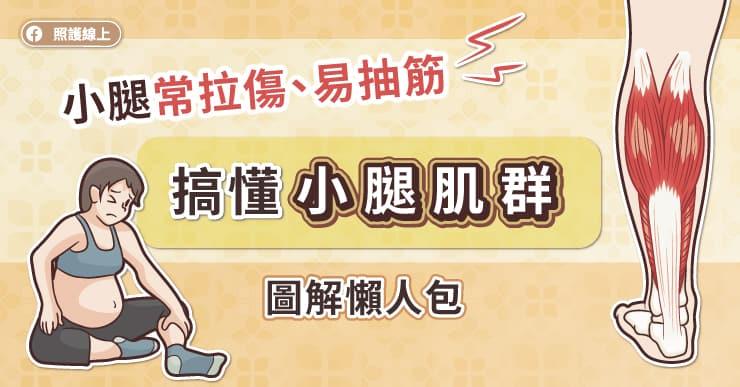
小腿常拉傷、易抽筋,搞懂小腿肌群(圖解懶人包)
-
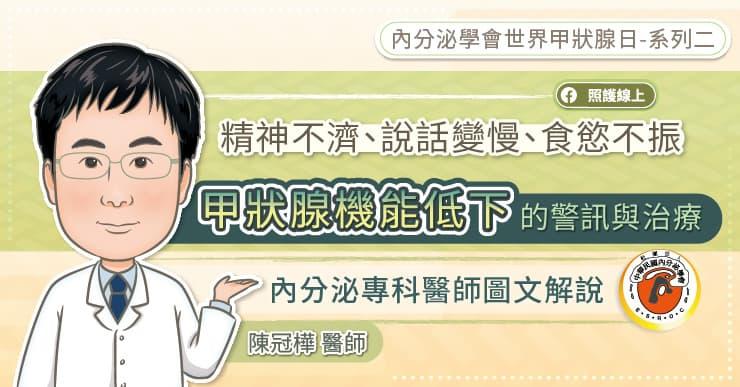
精神不濟、說話變慢、食慾不振,甲狀腺機能低下的警訊與治療
-
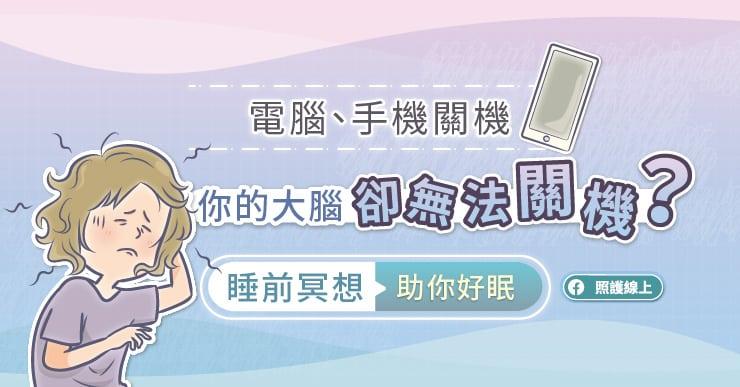
電腦、手機關機,你的大腦卻無法關機?睡前冥想助你好眠
-
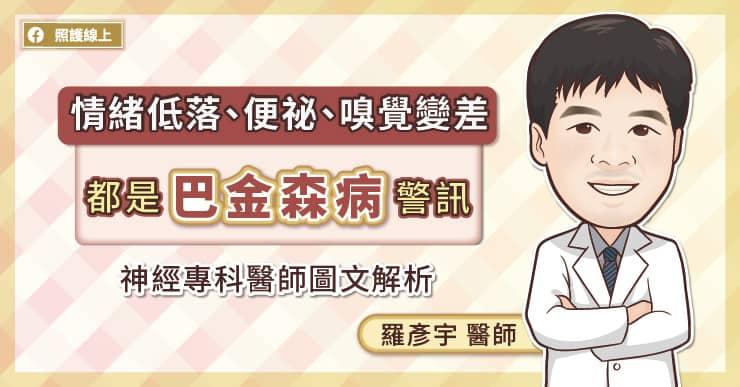
情緒低落、便祕、嗅覺變差都是巴金森病警訊
-

這樣呼吸更健康!呼吸治療師教你 從呼吸訓練中放鬆身體、找回自我
-

為什麼肚子痛?一張圖讓你秒懂!從腹痛 6 位置看可能疾病、這些症狀當心大病前兆
HOT -
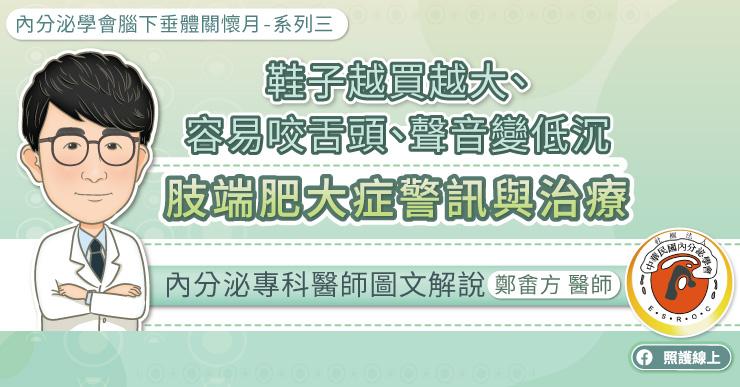
肢端肥大症警訊與治療
-

眼睛乾癢缺保濕!喝4種飲品明目又護眼
-
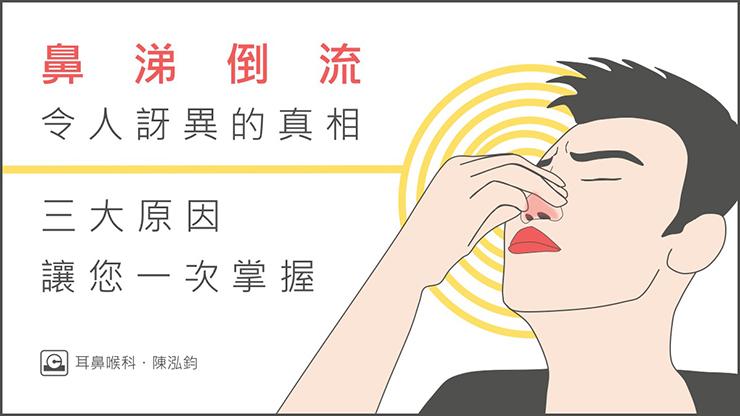
鼻涕倒流令人訝異的真相!三大原因讓您一次掌握
-
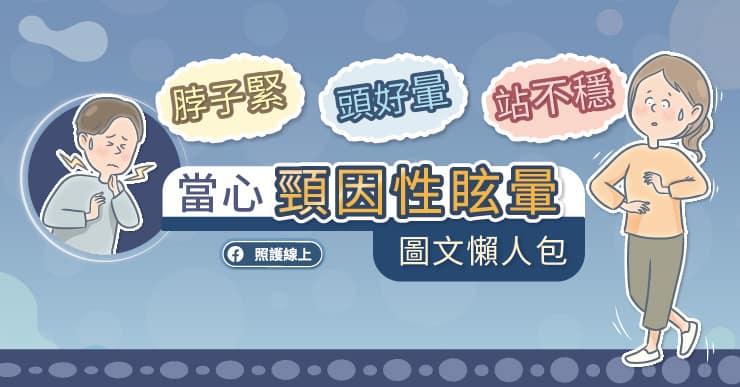
脖子緊,頭好暈,站不穩-可能是「頸因性眩暈」
-

從報警到送醫102分鐘救不回!南山獨董「心肌梗塞」高鐵上驟逝…台大心臟權威:有這些徵兆1小時內速就醫
-
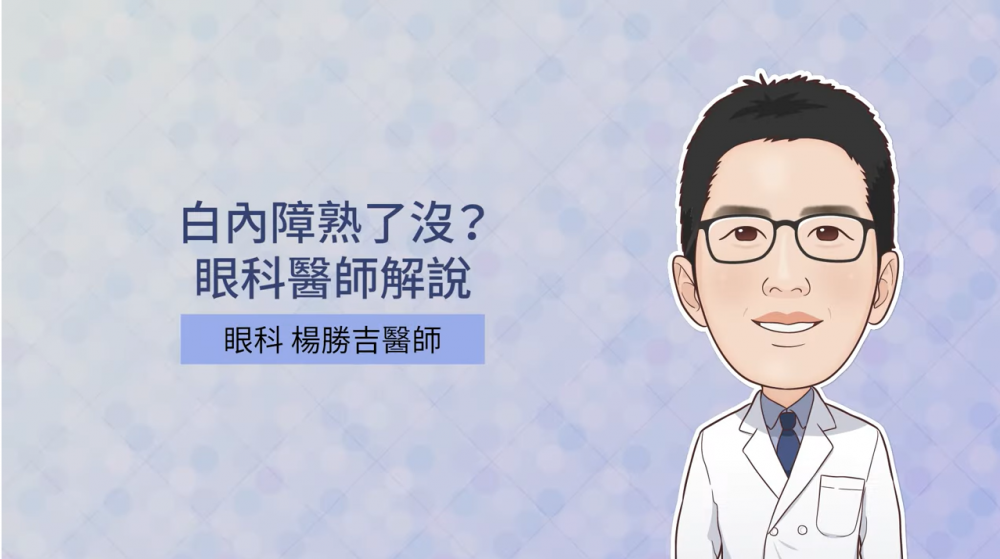
白內障熟了沒?
-
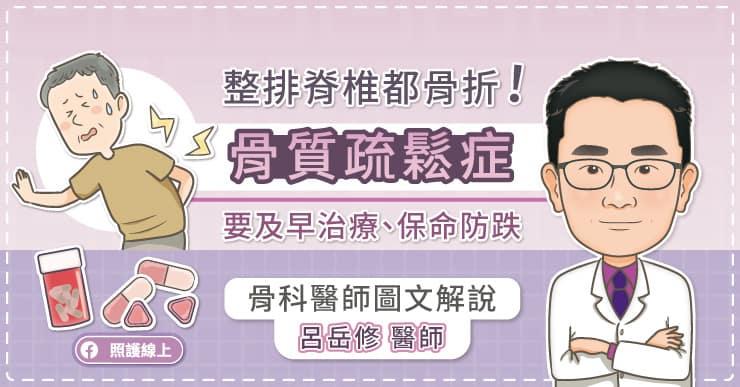
骨質疏鬆症要及早治療、保命防跌
-
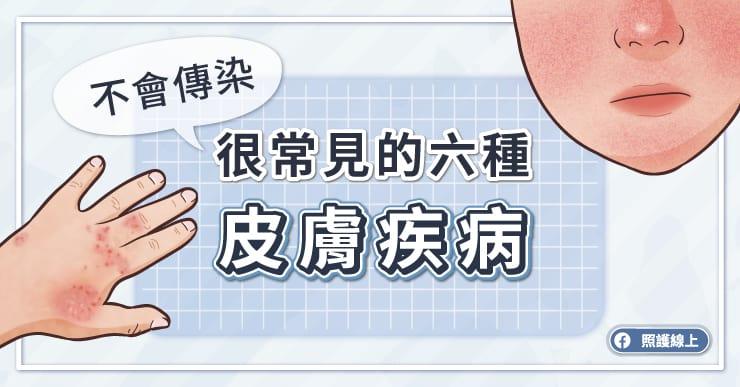
不會傳染,很常見的六種皮膚疾病
-

預防衰弱5字訣
-

椎間盤突出的復健運動
-

落枕自救法
-

天冷擦護手霜越用越乾?專家教兩秘訣「隔天手部嫩又亮」
-
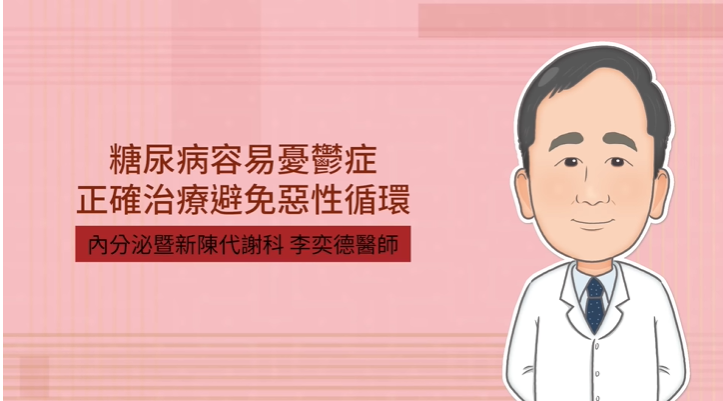
「控糖鐵三角」原則,讓控糖更有信心不憂鬱
-
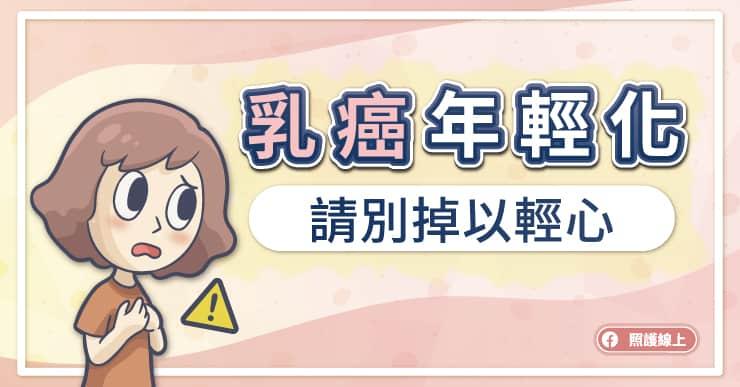
乳癌年輕化,請別掉以輕心
-
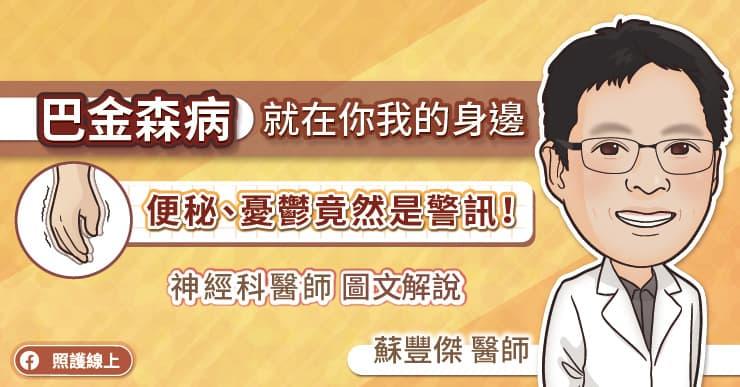
巴金森病就在你我的身邊!便祕、憂鬱竟然是警訊,神經科醫師圖文解說
-
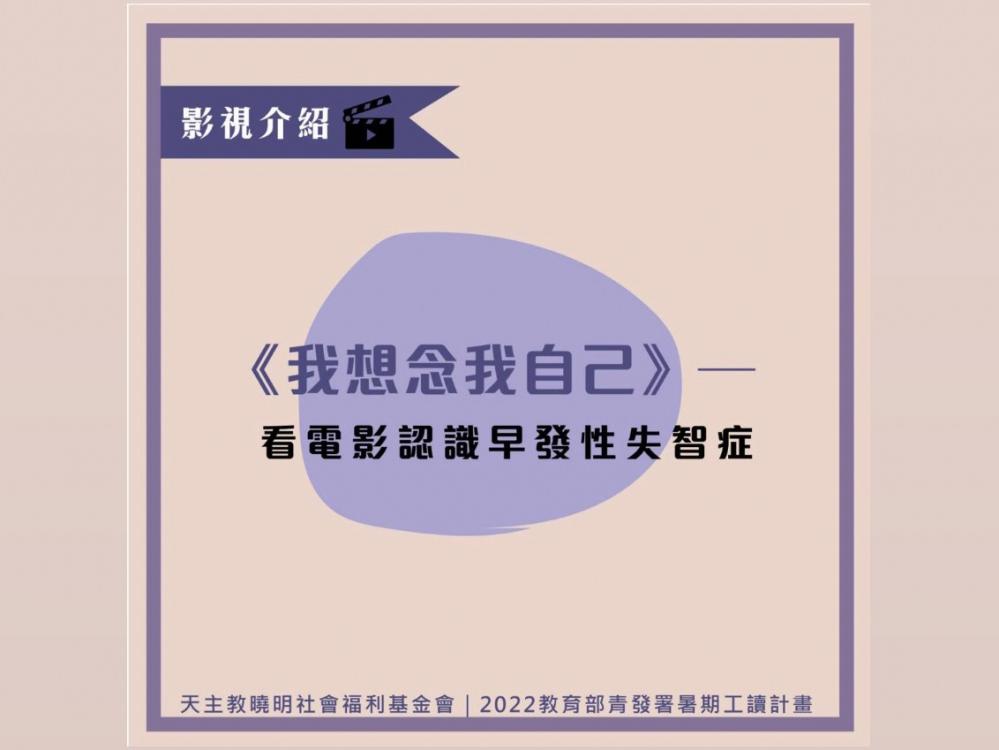
【電影中的腦科學 X《我想念我自己》】
-

過度午睡可能是失智症徵兆!
-
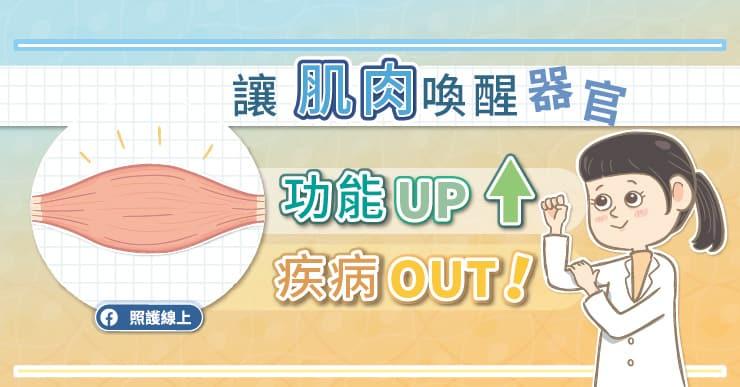
讓肌肉喚醒器官,功能UP,疾病OUT!
-
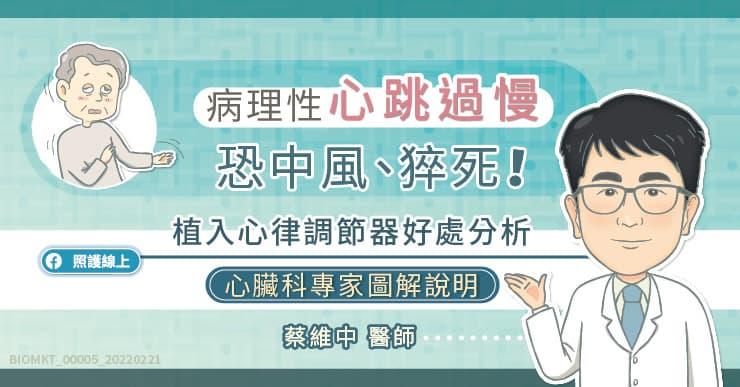
病理性「心跳過慢」恐中風、猝死!
-

面對照顧壓力、職場工作,我該怎麼辦
-

「遺囑」是用來照顧真正想照顧的人
-

【失智關懷讓我們幫助您❤️】
-
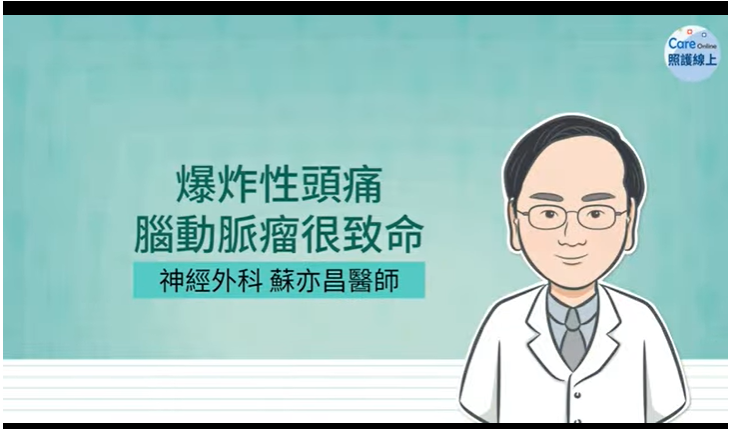
爆炸性頭痛,腦動脈瘤很致命
-

睡不好最大原因是夜尿症!4種分類先判別再就醫
-
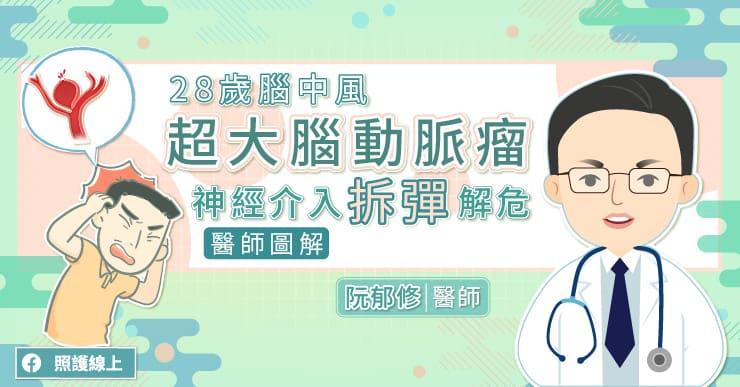
28歲腦中風!超大腦動脈瘤,神經介入拆彈解危,醫師圖解
-

長照微電影失智旋轉木馬篇-國語版
-

假牙材質很多種,究竟有什麼差別?
-
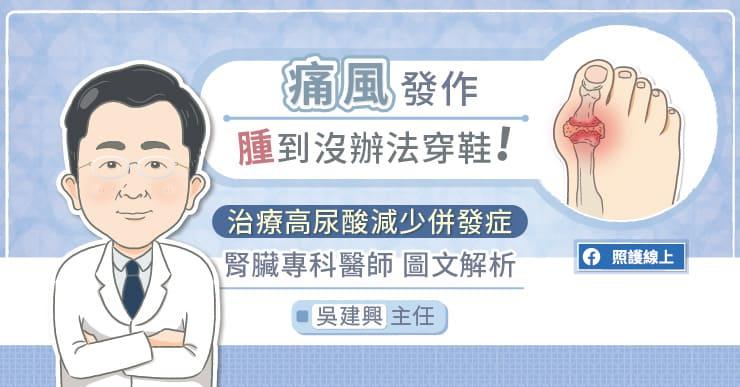
痛風發作,腫到沒辦法穿鞋!
-
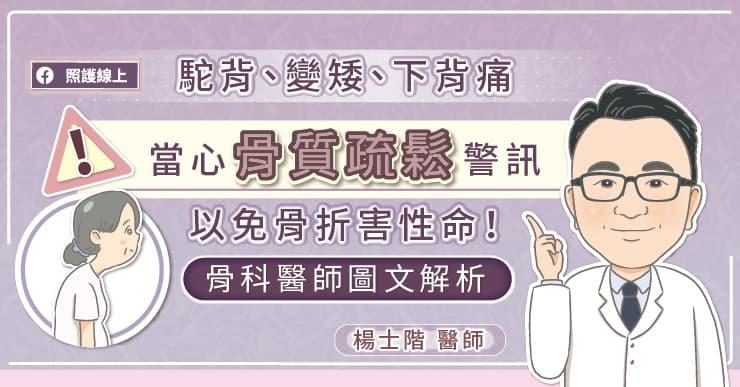
駝背、變矮、下背痛,當心骨質疏鬆警訊
-

缺牙怎麼辦?
-

掌握「四不三要」就能提升睡眠品質!
-
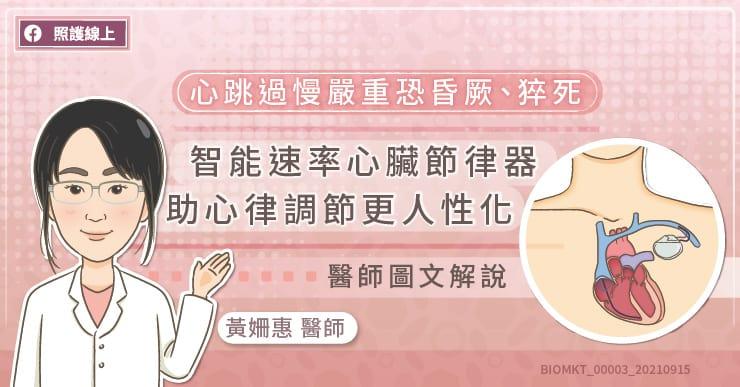
心跳過慢嚴重恐昏厥、猝死
-
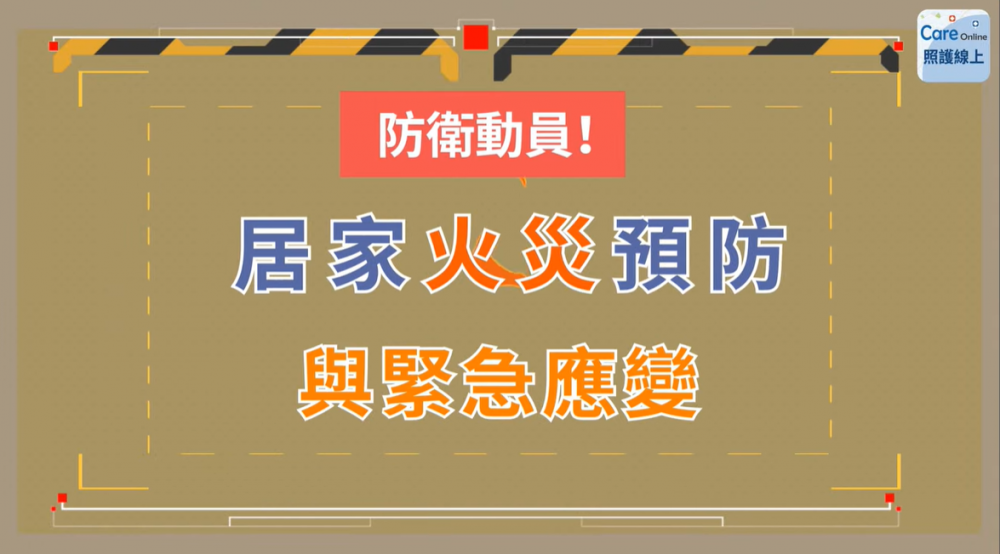
防衛動員!居家火災預防與緊急應變
-

疫情「預期性焦慮症」擾身心
-
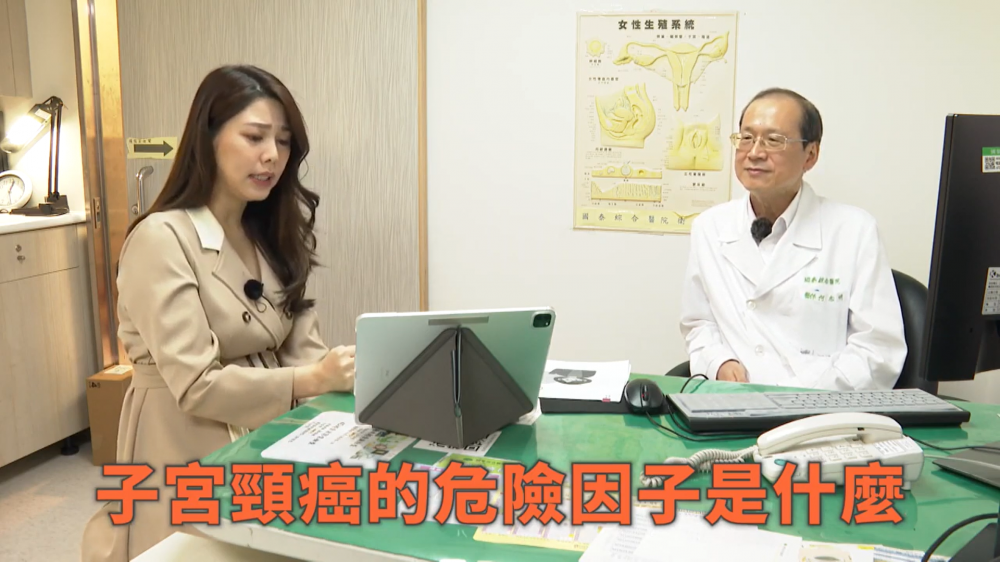
認識子宮頸抹片檢查流程
-
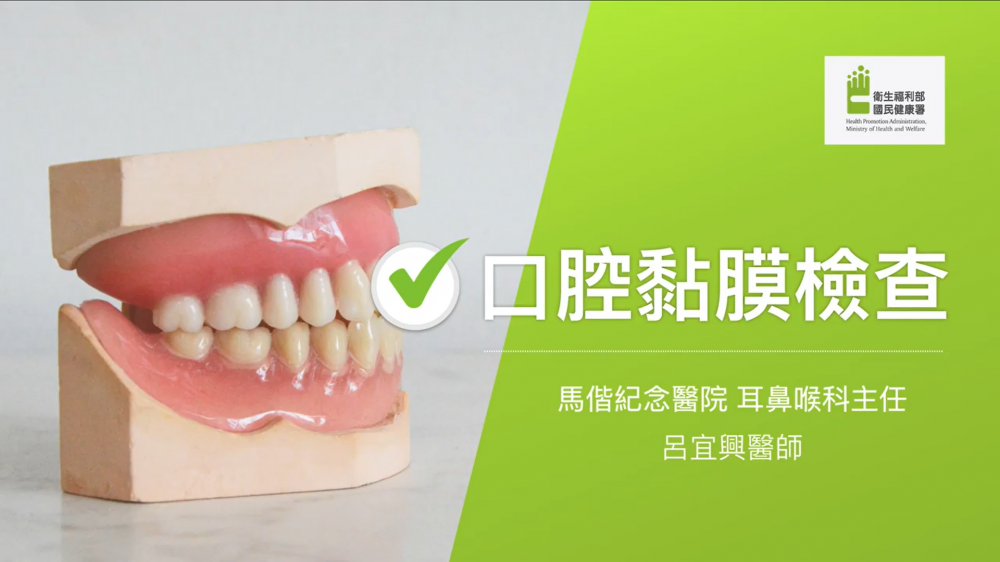
口腔癌防治衛教影片
-

高溫襲擊,小心熱傷害
-

生活中的電磁波
-

口乾!你是不是常嘴巴很乾燥?五個問題簡介口乾症
-
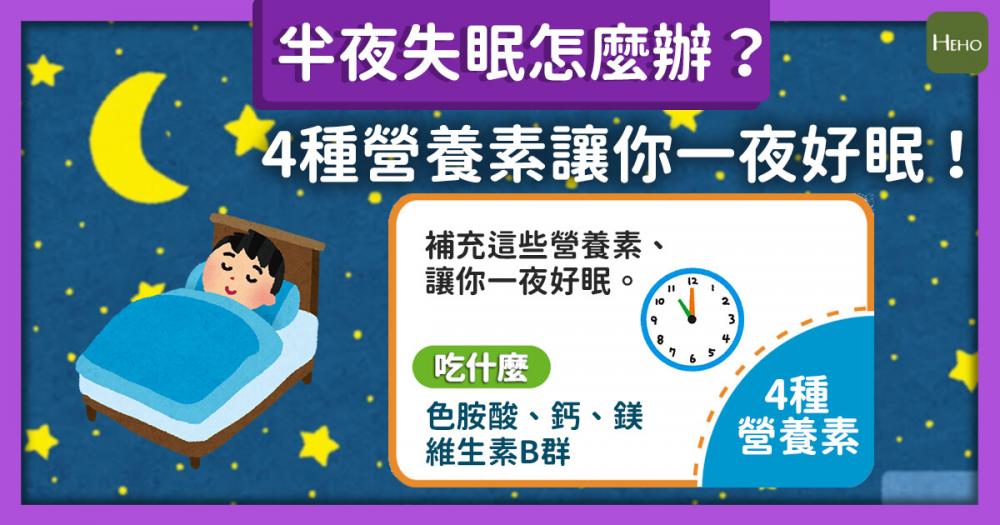
半夜失眠怎麼辦?4種營養素讓你一夜好眠!
-

眼壓太高怎麼辦?教你自我檢測及按對 5 個穴道降壓又明目
HOT -
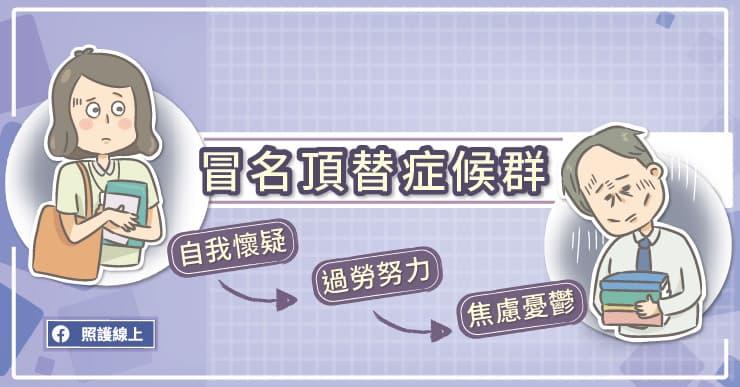
冒名頂替症候群(懶人包)
-
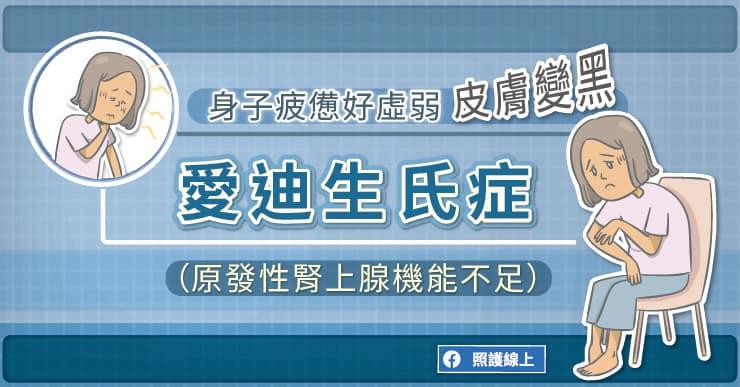
愛迪生氏症(原發性腎上腺機能不足)
-
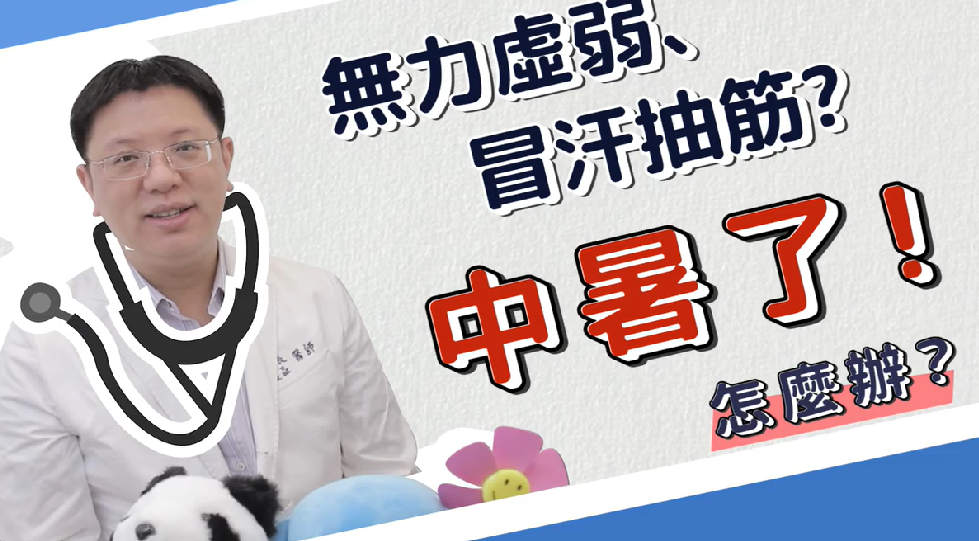
「中暑了」 該怎麼辦?
-

糖尿病周邊神經病變痛-厄夜驚魂完整版
-
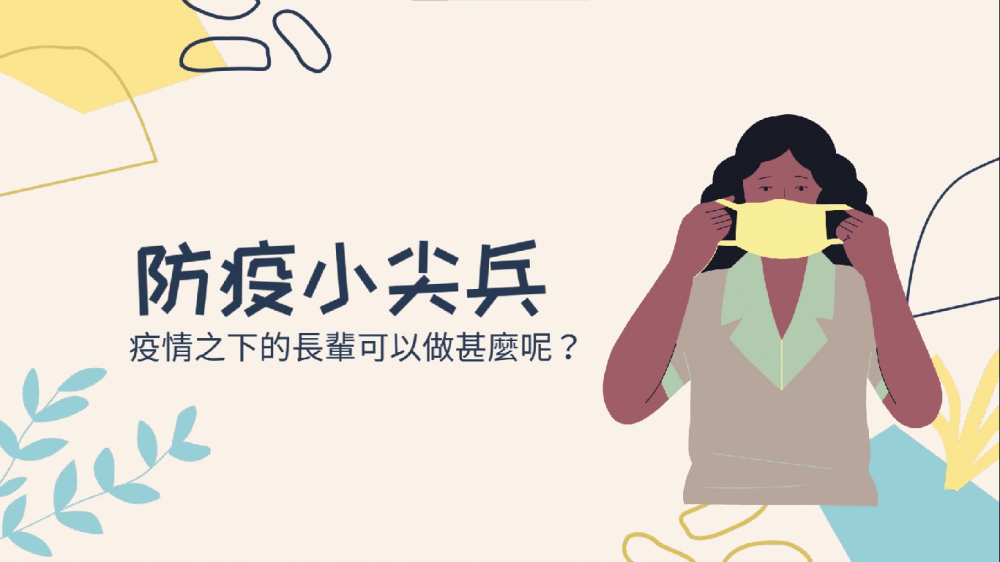
面對疫情,我們可以怎麼做....
-
向癌症治療六大副作用說掰掰!
-

新冠肺炎後疫情時代的骨鬆治療
-
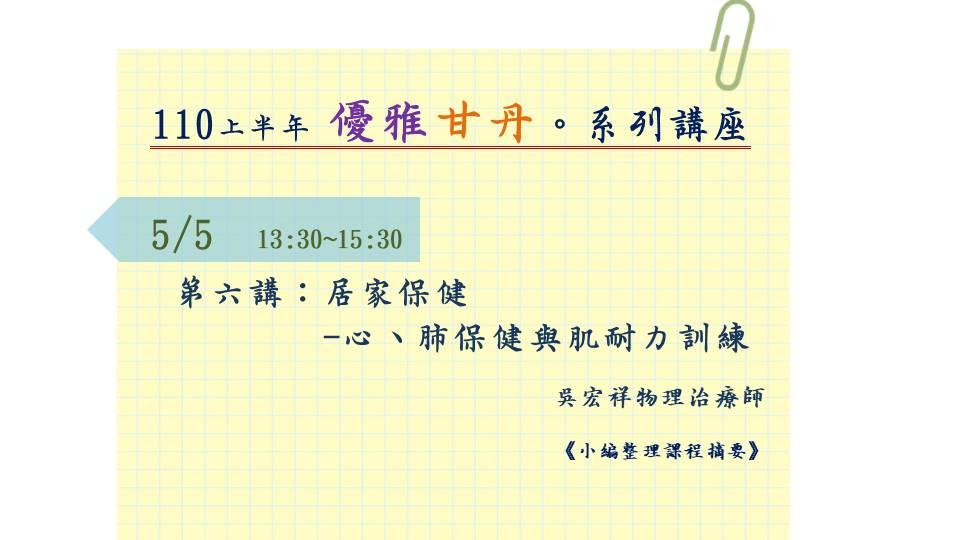
優雅甘丹。5/5 居家保健-心、肺保健與肌耐力訓練
-

青光眼來襲,多數沒自覺!正確診斷不只測眼壓,眼科醫師圖文解說
-

血壓多少才OK?有什麼症狀?高血壓最基礎知識(圖解懶人包)
-

下肢周邊動脈阻塞,介入治療、保養重點,專家圖解
-

癌友自療-與癌共處
-

省水小妙招
-

自癒力教室-找回食物好滋味
-

自癒力教室-人際四妙招
-

自癒力教室-輕鬆動腦不失智
-

憶起找回笑容:失智共同照護中心
-

終活代辦事項
-

淺談安心減壓
-

What Should We Do When Confronting Cancer
-

What is the National Advisory Line for the Elderly?
-

Elder Happy Land: A Geriatric Daycare Center
-

Breathe and Relax Muscles is Easy! Tips from a Psychiatrist
-
Shu-Fen Chang Discusses Philosophies in the Face of COVID-19
-

Exhausted From Taking Care of Others: Resources For Caretakers
-
Wash Your Hands With the Nun!
-
Washing your Hands is the Key to Fighting the Virus
-
How do we Face the Last Stages of Life? “Don’t become a burden to our children.” says Nien-Jen, Wu.
-
Plan a Perfect Retirement Plan with Three Buckets of Gold
-
Two Life Stages that you Must Face When Planning your Retirement
-
The Importance of a Retirement Plan
-
Happy Retirement(III)
-
Happy Retirement(II)
-
What to Prepare for Retirement?
-

You can live your life at 85 like this!
-
The Lucky Trilogy of Man Chuan Chang
-
Do Not Run from Negativity, “Embrace It”—Kevin Tsai
HOT -

Practicing goodbyes: The café that made death warmer
-

Six Misconceptions of a Home Service Provider








 at the first time visiting this website each day
at the first time visiting this website each day